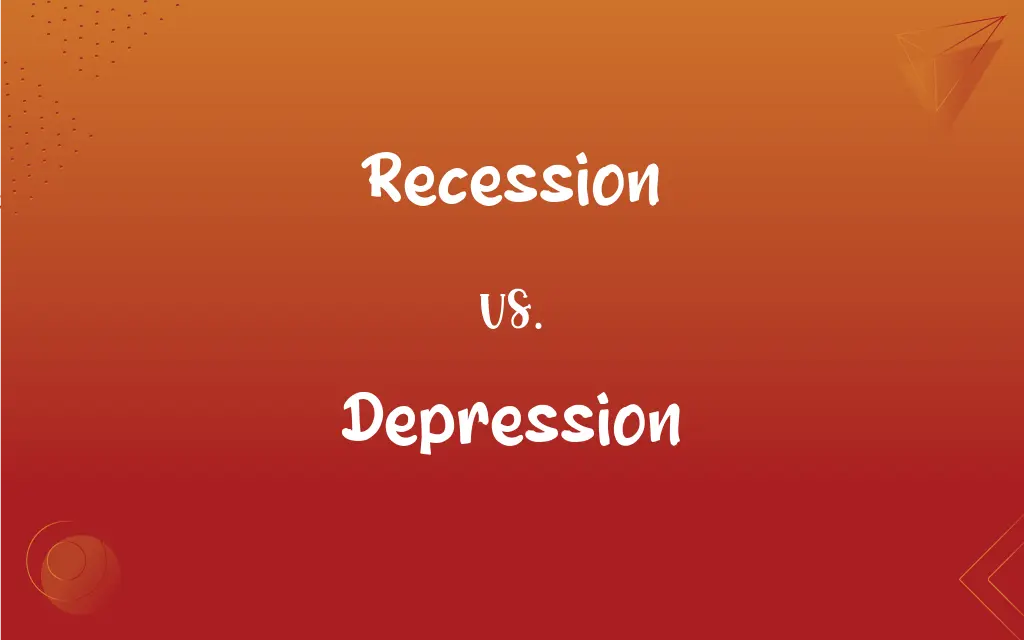Recession vs. Depression: What's the Difference?
Edited by Aimie Carlson || By Janet White || Published on November 2, 2023
A Recession is a temporary economic downturn, while a Depression is a prolonged and severe economic slump.

Key Differences
A Recession is generally defined as a decline in GDP for two or more consecutive quarters. While negative growth is concerning, it's a normal part of economic cycles. A Depression, conversely, is a much more severe and extended decline in economic activity.
Recessions are often characterized by decreased consumer spending, higher unemployment rates, and a contraction in the economy. Depressions, on the other hand, witness even steeper declines in consumer spending, soaring unemployment rates, and prolonged economic hardships.
While Recessions can be a natural part of the economic cycle and may occur more frequently, Depressions are rare and can last for many years. The economic challenges faced during a Depression are more profound than those in a Recession.
Policy responses to Recessions often involve monetary and fiscal interventions to stimulate the economy. In contrast, addressing a Depression might require more aggressive and prolonged interventions due to its deep-rooted and extensive economic impact.
Another point of distinction is public perception. While Recessions may cause unease, the term "Depression" often invokes memories of the Great Depression of the 1930s, marked by extreme economic decline and immense human suffering.
ADVERTISEMENT
Comparison Chart
Duration
Typically shorter, months to a couple of years
Prolonged, often several years
Economic Decline
Moderate decline in GDP
Severe and sustained decline in GDP
Unemployment
Increase, but less severe
Significant increase, often double-digit percentages
Frequency
More common, part of economic cycles
Rare events, not part of regular economic cycles
Policy Interventions
Monetary and fiscal policies to stimulate the economy
Aggressive and sustained interventions required
ADVERTISEMENT
Recession and Depression Definitions
Recession
A temporary reduction in a country's gross domestic product.
The government introduced new policies to combat the Recession.
Depression
A long and severe downturn in an economy.
The Great Depression of the 1930s affected millions globally.
Recession
A phase in the business cycle marked by economic slowdown.
The company's profits dwindled during the Recession.
Depression
An extended period of economic decline greater than a Recession.
The country took years to recover from the Depression.
Recession
A general decline in economic activity across the economy.
The Recession led to increased unemployment rates.
Depression
A prolonged period of high unemployment and reduced economic activity.
Banks failed and businesses shuttered during the Depression.
Recession
A period of economic decline lasting for a short duration.
Many experts believe the stock market crash triggered the Recession.
Depression
The act of depressing.
Recession
A downturn in economic growth lasting more than a few months.
Consumer confidence was low during the Recession.
Depression
The condition of being depressed.
Recession
The erosion of a cliff or headland from a given point, as from the action of a waterfall.
Depression
An area that is sunk below its surroundings; a hollow.
Recession
The reduction of a glacier from a point of advancement.
Depression
The condition of feeling sad or despondent.
Recession
The motion of celestial objects away from one another in an expanding universe.
Depression
A mood disorder characterized by persistent sadness or inability to experience pleasure combined with other symptoms including poor concentration, indecisiveness, sleep problems, changes in appetite, and feelings of guilt, helplessness, and hopelessness. Also called clinical depression, major depressive disorder.
Recession
A significant period of economic decline from the peak to the trough of a business cycle, characterized by decreasing aggregate output and often by rising unemployment.
Depression
A reduction in physiological vigor or activity
A depression in respiration.
Recession
The withdrawal in a line or file of participants in a ceremony, especially clerics and choir members after a church service.
Depression
A lowering in amount, degree, or position
Depression of stock prices.
Recession
The restoration of property by a grantee back to the previous owner by means of a legal conveyance.
Depression
A period of drastic economic decline, characterized by decreasing aggregate output, falling prices, and rising unemployment.
Recession
The act or an instance of receding or withdrawing.
Depression
A period of widespread poverty and high unemployment.
Recession
A period of low temperatures that causes a reduction in species; ice age.
Depression
Depression See Great Depression.
Recession
(economics) A period of reduced economic activity
Statisticians often define a recession as negative real GDP growth during two consecutive quarters.
Depression
(Meteorology) A region of low barometric pressure.
Recession
The ceremonial filing out of clergy and/or choir at the end of a church service.
Depression
The angular distance below the horizontal plane through the point of observation.
Recession
The act of ceding something back.
Depression
(Astronomy) The angular distance of a celestial body below the horizon.
Recession
(surgery) A procedure in which an extraocular muscle is detached from the globe of the eye and reattached posteriorly.
Depression
A state of mind producing serious, long-term lowering of enjoyment of life or inability to visualize a happy future.
I used to suffer from depression, but now I'm mostly content with my life.
Recession
The act of receding or withdrawing, as from a place, a claim, or a demand.
Mercy may rejoice upon the recessions of justice.
Depression
A period of low morale or unhappiness (a period of experiencing the above-mentioned state of mind) which lasts longer than several weeks and may include ideation of self-inflicted injury or suicide.
Recession
A period during which economic activity, as measured by gross domestic product, declines for at least two quarters in a row in a specific country. If the decline is severe and long, such as greater than ten percent, it may be termed a depression.
Depression
(geography) An area that is lower in topography than its surroundings.
Recession
A procession in which people leave a ceremony, such as at a religious service.
Depression
(meteorology) An area of lowered air pressure that generally brings moist weather, sometimes promoting hurricanes and tornadoes.
Recession
The act of ceding back; restoration; repeated cession; as, the recession of conquered territory to its former sovereign.
Depression
(economics) A period of major economic contraction.
Recession
The state of the economy declines; a widespread decline in the GDP and employment and trade lasting from six months to a year
Depression
Four consecutive quarters of negative, real GDP growth. See NBER.
The Great Depression was the worst financial event in US history.
Recession
A small concavity
Depression
The act of lowering or pressing something down.
Depression of the lever starts the machine.
Recession
The withdrawal of the clergy and choir from the chancel to the vestry at the end of a church service
Depression
A lowering, in particular a reduction in a particular biological variable or the function of an organ, in contrast to elevation.
Recession
The act of ceding back
Depression
The act of depressing.
Recession
The act of becoming more distant
Depression
The state of being depressed; a sinking.
Depression
A falling in of the surface; a sinking below its true place; a cavity or hollow; as, roughness consists in little protuberances and depressions.
Depression
Humiliation; abasement, as of pride.
Depression
Dejection; despondency; lowness.
In a great depression of spirit.
Depression
Diminution, as of trade, etc.; inactivity; dullness.
Depression
The angular distance of a celestial object below the horizon.
Depression
The operation of reducing to a lower degree; - said of equations.
Depression
A mental state characterized by a pessimistic sense of inadequacy and a despondent lack of activity
Depression
A long-term economic state characterized by unemployment and low prices and low levels of trade and investment
Depression
A sunken or depressed geological formation
Depression
Sad feelings of gloom and inadequacy
Depression
A time period during the 1930s when there was a worldwide economic depression and mass unemployment
Depression
An air mass of lower pressure; often brings precipitation;
A low moved in over night bringing sleet and snow
Depression
A state of depression and anhedonia so severe as to require clinical intervention
Depression
A concavity in a surface produced by pressing;
He left the impression of his fingers in the soft mud
Depression
Angular distance below the horizon (especially of a celestial object)
Depression
Pushing down;
Depression of the space bar on the typewriter
Depression
A deep and persistent recessionary phase.
The Depression saw a sharp decline in industrial production.
Depression
A major and sustained downturn in the economy.
The effects of the Depression were felt for over a decade.
FAQs
What defines a Recession?
A Recession is usually defined as two consecutive quarters of negative GDP growth.
How is a Depression different from a Recession?
A Depression is a longer and more severe downturn than a Recession.
How long does a Recession typically last?
Recessions can last from a few months to a couple of years.
How do businesses typically fare in a Depression?
Many businesses struggle or fail during a Depression due to reduced consumer demand.
What can governments do to combat a Recession?
Governments can use monetary and fiscal policies to stimulate the economy during a Recession.
Are Depressions common in modern economies?
No, Depressions are rare compared to Recessions.
Was the economic crisis of 2008 a Recession or Depression?
The 2008 crisis is commonly referred to as the Great Recession.
How does unemployment vary between a Recession and Depression?
Unemployment is higher in a Depression than in a Recession.
Can a Recession turn into a Depression?
Yes, if a Recession is deep and prolonged, it can evolve into a Depression.
What's the most famous Depression in history?
The Great Depression of the 1930s is the most well-known.
What are the psychological effects of a Recession on society?
A Recession can lead to increased stress, anxiety, and uncertainty in society.
Is it possible for an economy to recover quickly from a Recession?
Yes, with the right policies, economies can experience a rapid recovery from a Recession.
How do global markets influence a Depression?
Global markets are interconnected, so a Depression in one can impact others.
Is it advisable to invest during a Recession?
It depends; some view Recessions as opportunities, while others prefer to wait.
Do central banks play a role in managing Recessions?
Yes, central banks often adjust interest rates and enact policies to address Recessions.
How did people cope during the Great Depression?
People used various means, from bartering to forming community support groups.
Do Recessions have any positive effects?
Recessions can lead to economic adjustments, shedding inefficient practices.
Can personal savings help during a Recession?
Yes, savings can act as a financial cushion during economic downturns like Recessions.
Are there global Depressions?
Yes, a Depression in major economies can have worldwide effects.
Can a country be in Depression while others are growing?
Yes, Depressions can be isolated, but they often have global repercussions.
About Author
Written by
Janet WhiteJanet White has been an esteemed writer and blogger for Difference Wiki. Holding a Master's degree in Science and Medical Journalism from the prestigious Boston University, she has consistently demonstrated her expertise and passion for her field. When she's not immersed in her work, Janet relishes her time exercising, delving into a good book, and cherishing moments with friends and family.
Edited by
Aimie CarlsonAimie Carlson, holding a master's degree in English literature, is a fervent English language enthusiast. She lends her writing talents to Difference Wiki, a prominent website that specializes in comparisons, offering readers insightful analyses that both captivate and inform.







































































